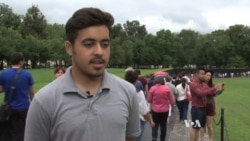Many called it Pakistan’s 9/11 when Taliban militants indiscriminately killed schoolchildren and teachers last year at Pakistan’ Army Public School. In response, Pakistan's army expanded military operations, parliament ordered up military tribunals, and the country revived the use of the death penalty.
One hundred forty-five people were killed that December morning, 132 of them schoolchildren. While the government responded with force, the students have gone on learning.
Twelve of the school survivors, along with two of their teachers are wrapping up a two-week study tour in the United States.
Invited by the Washington-based think tank Meridian, they took part in a nanotechnology research project at State University of New York Polytechnic Institute's Colleges of Nanoscale Science and Engineering and met with American students and officials.
One of the survivor students, Mohammad, identified only by his first name for safety reasons, told VOA Urdu that “people here are really friendly and despite language barriers, we can talk to them and they are very helpful.”
While the media was asked not to discuss the APS massacre with the students, Tehmina Hasan, a teacher at the Army Public School, said the students are very brave and have fought back really well.
“This is a great learning opportunity for them because if you have a clear concept, then it is not difficult to build upon it. The university, which is sponsoring the nanotechnology project, is getting these kids to work in a group with four American students,” said Hasan.
The head of Meridian International Institute, and former U.S. envoy to the United Nations, Stuart Holliday said one goal of the trip is for the students to make friends and spread the message of friendship.
“What we are doing is simply what we do with thousands of other young people from around the world, which is giving them an opportunity to really understand American society and culture," said Holliday. "But also some of the skills that they’re going to need to be successful back home in Pakistan.”
Muhammad said it has been a good experience for him to let Americans know about Pakistan and to learn about American society. “Religion is a personal choice, and humanity comes before religion, and that is what I saw in people here. They do not treat others based on their religion.”
William Barth of Ridgefield High School in Ridgefield, Connecticut, along with three other American students has been with the group since their arrival.
"This trip has given me a chance to see Pakistan in different way," he said. " Before this, I saw it through news media and mostly framed in the context of war on terror. I think you can find common ground with anyone if you try hard enough."
In Albany, the boys participated in a NanoDiscovery Institute hosted by SUNY Polytechnic’s Colleges of Nanoscale Science and Engineering. They learned about microfluidics, hydrogels, aerogels, microelectronics, wafer patterning, careers in nanotechnology, and much more.
They broke into four groups, each with three Pakistanis and one American, to come up with a nanotechnology invention and business plan, which they presented to science and business leaders at the close of their program.
When asked how much these kids can pick up in the short period of two weeks, Holliday said, “Well, if you talk to people who have gone through these programs, they’re very impactful even if they’re short in duration. And the relationships last far beyond the two weeks.”
While no foreign trip can bring the back the friends the students lost in the gruesome terrorist attack on their school, the new friends they make during this trip may help in healing some wounds.





